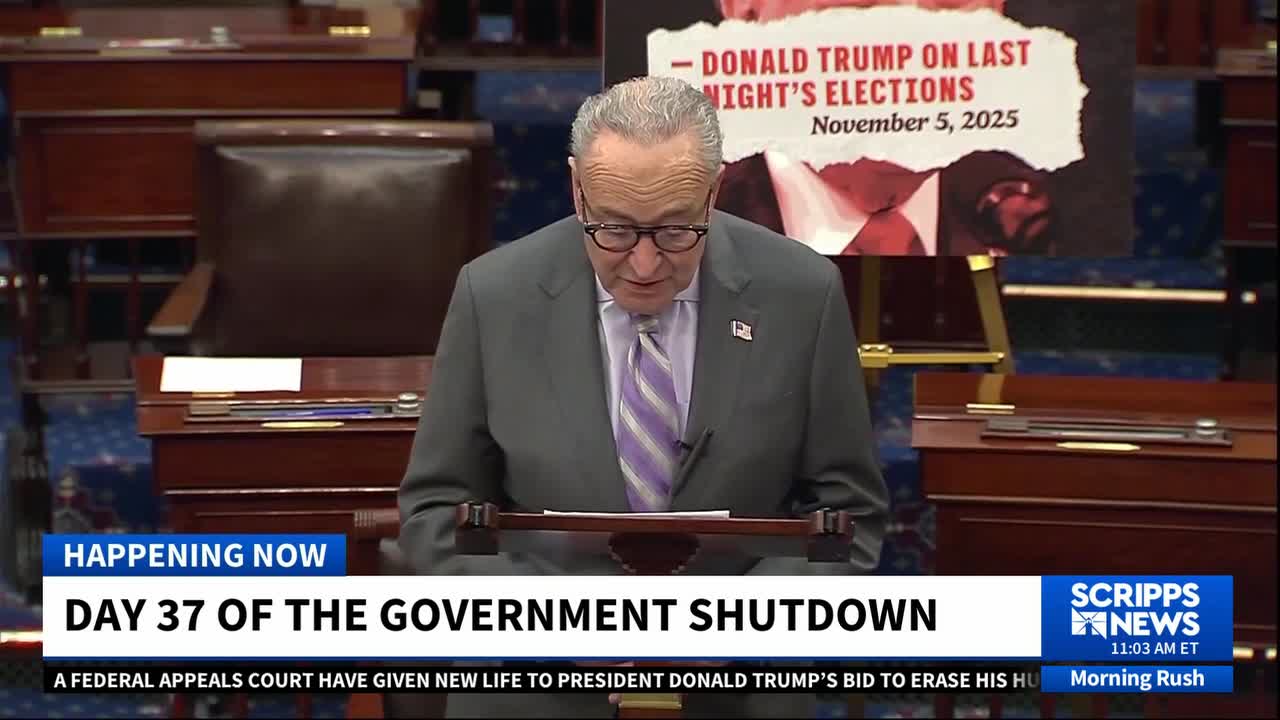The federal government shutdown stretched into day 37 Thursday, marking the longest in U.S. history. Talks of a potential bipartisan agreement are emerging among some senators, though the path forward remains unclear.
Some Democrats are advocating for a one-year extension of Affordable Care Act tax credits to end the shutdown, while others want the credits permanently extended as part of a broader deal to reopen the government. Many Republicans have said they will not consider those proposals unless Democrats first agree to reopen federal agencies.
However, Sen. Chris Coons, D-Conn., one of the lawmakers involved in negotiations, told Scripps News he is optimistic that discussions are heading in the right direction.
RELATED STORY | These 40 airports are reportedly among those facing cuts due to government shutdown
"The off ramp is for the president to get involved and to say to [House] Speaker [Mike] Johnson, 'bring the House back in, add a one-year extension to the Affordable Care Act tax credits,' and we could be, I suspect we could open within the hour," Coons said.
"So many of us want to see the shutdown end and don't see our leaders talking directly," he added. "... For us to have any confidence about what the House will do, either the president has to get involved or Speaker Johnson has to say they're willing to actually engage."
Coons outlined two possible ways forward. The first is for President Trump to intervene. However, during a Thursday White House event focused on weight-loss drug costs, the president avoided the topic of the shutdown. He has largely left negotiations to Congress, seeking to push Senate Democrats to accept a Republican funding bill without direct talks.
The second option involves congressional leaders striking a deal — but House Speaker Mike Johnson said Thursday he would not agree to any backroom arrangement to reopen the government.
Questions remain about whether the Senate could move forward on extending Affordable Care Act subsidies and whether Johnson would bring such a proposal to the House floor. Until that happens, the shutdown is expected to continue.
Trump has suggested Republicans could end the shutdown by eliminating the Senate filibuster, a rule that requires 60 votes to limit debate and pass most legislation — a threshold that allows Democrats to block GOP initiatives despite the party’s 53-seat majority.
IN CASE YOU MISSED IT | Trump wants ‘nuclear option’ to end shutdown; it could shake Capitol Hill to its core
Several Republicans told Scripps News they are open to discussing filibuster reforms, but most strongly oppose eliminating it. They warn that doing so could backfire if Democrats gain full control of Congress and the White House.
"I don't want to change the filibuster rule simply because every time parties change and you have different presidents and different parties, you'll have wild swings in policy and it'd be very disruptive to the country," said Sen. Lindsey Graham, R-S.C. "I think the filibuster plays a role in terms of providing stability, requiring consensus. But having said that, the president is rightly frustrated with the pace of things and ... I'd like to see our Democratic friends help us more."
Sen. Thom Tillis, R-N.C., who is retiring, told Scripps News that Republicans lack the votes to scrap the filibuster, making changes unlikely. GOP leaders also fear Democrats could use a filibuster-free Senate to grant statehood to Washington, D.C., and other U.S. territories, potentially adding more Democratic seats.




